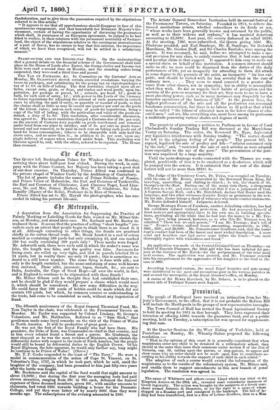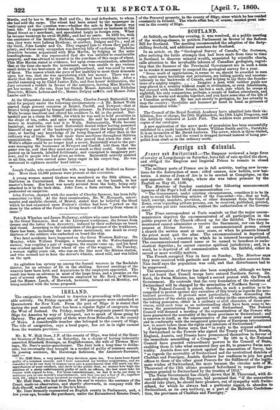rnilturtal.
The people of Hartlepool have received an intimation from her Ma- jesty's Government, to the effect, that it is not probable the Reform Bill will include the Hartkpools in the groups of new representative boroughs.
The Town Council of Hull has invited the Royal Agricultural Society to hold its meeting for 1861 in that borough. They have expressed their intention of offering 1500/. towards the guarantee fund, and at a public meeting, held on Tuesday, a subscription list was opened for supplement- ing that sum.
At the Quarter Sessions for the West Riding of Yorkshire, held at Pontefract on Monday, Mr. .Wheatly-Balme proposed the following resolution :— " That in the opinion of this court it is generally expedient that when magistrates order any child to be detained in a reformatory school, they should at the same time issue their summons under section 8 of the 21st of Victoria, cap. 55, calling upon the parent, or step-parent, to appear and show cause why an order should not be made upon him to contnbute ac- cording to his ability towards the support of such child in such schbol." The adoption of such a course would extend the information of the magistrates as to the results of the reformatory system, Mr. Milnes said, and enable them to suggest amendments in this new branch of penal legislation. The resolution was agreed to.
The cause of Whitmore and others versus Lloyd which was tried at the Kingston Assizes on the 29th ult., revealed some remarkable instances of Greek ingerruity. The action was brought by the assignees of a Greek mer- chant named Antonio di Demetrio, to try the right to a cargo of wheat shipped at a Russian port and consigned to the bankrupt. The bill of la- ding had been transferred, first to a firm of Lebous Brothers, then to a Mina Martin, and by her to Messrs. Hall and Co., the real defendants, to whom she had sold the cargo. The wheat had been seized by the messenger in bankruptcy and the question was—whether the sale to Miss Martin was bona fide. It appeared that Antonio di Demetrio carried on business in Old Broad Street as a merchant, and speculated largly in foreign corn. When he became bankrupt he owed 60,0001., and had no assets. In 1859 he, with the assistance of his brother, Nicholas, engaged three counting-houses ; at one' they were were Lebous Brothers; at another, Dalguy and Co. ; and at the third, John Lambe and Co. They engaged lads to whom they paid no salary, and whose only occupation was drawing bills of exchange. Nicholas Demetrio became acquainted with Miss Martin, by lodging at the same boardinghouse. It was represented that she was entitled to considerable property, and was advised to invest it in the purchase of this cargo of wheat. This Miss Martin stated in evidence, but upon cross-examination, admitted that at the time she made the investment, she was unable to pay various small debts to her tradesmen in the neighbourhood, and was sued by some of them. The reason which she gave of her inability to meet their demands upon her was, that she was speculating with her money. There was no doubt that the purchase by the Messrs. Hall had been bond fide. After a careful summing up by Chief Justice Erie, and four hours' deliberation, the Jury returned a verdict in favour of the assignees, leaving Miss Martin to get her money, if she can, from her friends hiessrs. Antonio and Nicholas Demetrio, Messrs. Lebous and Co., Messrs. Dalguy anifiCo. and Messrs. John Iembe and Co.
At the Gloucester Assizes on Wednesday, Charles Joseph Batterahill was tried for perjury under the following circumstances :—A Mr. Robert Wells started large grocery concerns at Bristol, Cardiff, and Newport—that at Bristol being managed by himself and the prisoner. In Februrary last year, Wells became insolvent and offered his creditors Ts. 6d. in the pound. Etat- tershill put in a claim for 30001., for which he was said to hold securities in the shape of tea, coffee, and, spice warrants. He said he had earned the money in Australia, and lent it to Wells. Subsequently, Wells became bankrupt, and before the court Battershill denied either haying possessed himself of any part of the bankrupt's property since the beginning of the year, or having any knowledge of its being disposed of other than in the ordinary way of trade. He had made these assertions throughout thirteen examinations. Witnesses were called, who proved that when the state of Wells's affairs could be no longer kept a secret, Battershill went to the per- sons managing the businesses at Newport and Cardiff, told them that the game was up, and that they must save as much as they could. Goods were packed up in barrels, labelled fictitiously, and consigned to imaginary per- sons, and to people who had given no orders. Battershill actively assisted in all this, and even carried some lump sugar in his carpet-bag. He was sentenced to eighteen months' hard labour.
et Joseph Castle who murdered his wife, was hanged at Bedford on Satur- day. More than 15,000 persons were present at the execution.
A young woman named Graham was murdered on the 26th ultimo, at lembleton in Cumberland. She was found dead on the hearth, in her master's house. Her head was nearly severed from the body., being only attached to it bythe back akin. John Cass, a farm servant, has been ap- prehended on suspicion.
John Fenton charged with the murder of Charles Spencer, has been fully committed for Lid. At the final examination, Mr. W. Herapath, micro- scopist and analytic chemist, of Bristol, stated that he believed the blood which he had examined upon Fenton's clothes had been "jerked on the dress by the action of the heart—a living heart—of the party from whom it came."
Patrick Wheelan and James Hallaway, soldiers who came home from India in the Great Tasmania, died at the Liverpool workhouse, the former from dropsy and the latter from dysentery, induced by their sufferings on board this vessel According to the calculations of the governor of the workhouse, there has been, including the men above mentioned, one death in every thirteen of the soldiers who embarked on board the ship.
Two fatal accidents have happened on the Great Western Railway. On Monday, while William Trumper, a breaksman at the Wolverhampton station, was coupling a pair of waggons, the engine came up, and his head was crushed against the front wheel of one of the waggons. On Tuesday, a woman eighty years old, who was on.the line near the Billiton station, and who seemed not to hear the driver's whistle, stood still, and was killed on the spot.
An agitation has sprung up among the flannel weavers in the Rochdale district, for an advance of 2d. in the shilling. Several meetings of the weavers have been held, and deputations to the employers appointed. The result has been an advance in most of the large firms, and a promise on the part of several others. The weavers employed by Mr. Bury, of hiilnrow, and the Messrs. Leech, of ilorwich, however, turned out on Monday, not being satisfied with the terms proposed.



























 Previous page
Previous page